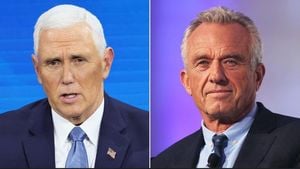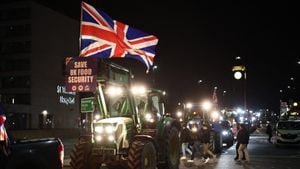After nearly two years of silence, German Chancellor Olaf Scholz finally reached out to Russian President Vladimir Putin. Scholz's call, made on Friday, has incited strong reactions, particularly from Ukraine’s President, Volodymyr Zelenskyy, who lamented its timing and implication, describing it as having opened "Pandora's box." The exchange marks the first conversation between the two leaders since December 2022, symbolizing potential shifts not only for European diplomacy but for the overarching conflict as well.
Zelenskyy has been vocal about his discontent with Scholz’s outreach, emphasizing during his evening address, "Now there may be other conversations, other calls. Just a lot of words." He fears this dialogue might serve Putin's desires to lessen his isolation on the global stage, bolstering the Kremlin leader’s position.
Chancellor Scholz's discussion with Putin lasted roughly one hour. During the call, Scholz expressed Germany's stance, condemning what he called "Russia's war of aggression". He reaffirmed the need for Russia to withdraw its troops and asserted Germany's firm commitment to support Ukraine against Russian advances. Spokesman Steffen Hebestreit communicated Scholz’s emphasis on negotiating for "a just and lasting peace" between Russia and Ukraine.
Following the call, the Kremlin’s tone was starkly different. Putin, as relayed by the Kremlin, indicated the necessity for any peace agreement to acknowledge "new territorial realities." He reiterated Russia's stipulated security concerns, including demands for Ukraine to abandon ambitions of joining NATO, conditions Ukraine has firmly rejected. The Russian leader’s response underlines the deep chasm between the two nations and their respective positions.
Zelenskyy’s response highlighting concerns about appeasement reflects the Ukrainian administration’s anxiety. He stressed the need for "concrete, strong actions" rather than dialogues viewed as indications of weakness. Ukraine’s foreign ministry echoed this sentiment, urging allies not to merely engage Russia but to enforce peace through significant pressure.
The significance of this conversation is underscored by its backdrop; the war, which commenced with Russia's invasion on February 24, 2022, is soon approaching its one-thousandth day. Historically, the conflict has seen extensive devastation, with little recourse toward peace, leading to mounting international concern.
This phone call surfaces amid heightened speculation over shifting U.S. foreign policy due to the impending administration of Donald Trump, who has approached the issue with skepticism about military aid to Ukraine. Trump's past suggestions of swiftly settling the conflict have raised questions on the viability of Western support for Ukraine. Both Ukraine and its allies are apprehensive about what this could mean for their collective efforts against Russian aggression, considering Trump’s characteristic unpredictability.
Although Scholz communicated with Zelenskyy before and after his call with Putin, the resulting frustration from Kyiv indicates there's dissension about Germany's engagement strategy with Russia. Reports suggest Scholz's communication was not explicitly coordinated with other allies, leaving room for speculation about the overall consensus among Western nations on how to handle Russia.
These developments aren't isolated but part of broader geopolitical dynamics. While Scholz and Putin continue discussions, the broader European response to the escalation of the conflict remains to be seen. Key players like France and the United States seem to be closely watching, uncertain of how this renewed communication might affect regional stability and support systems for Ukraine.
Scholz's insistence throughout the conversation on Germany's continued support and the condemnation of recent Russian tactics, particularly airstrikes against civilian areas, signals Germany's complex positioning. This duality may lead to increased scrutiny from both Germany’s internal political sphere and its Ukrainian allies. The Chancellor’s government is also preparing for upcoming elections, with pressures mounting to maintain strong stances against Russia.
So, what now? The war, long characterized by brutality and destruction, hangs heavily on Europe’s political climate. Scholz’s recent actions could mark either steps toward potential peaceful negotiations or could deepen the divide, particularly if seen as tacit acceptance of Russia's narratives and demands.
Despite existing frustrations, the discussion itself is noteworthy. It acknowledges the precarious balance of power and the continuing urgency for dialogue, even between adversaries. For now, the echoes of Scholz and Putin’s conversation reverberate beyond their immediate exchange, reflecting on how future communications may reshape both national policies and the international community's approach to one of the most challenging conflicts of our time.



